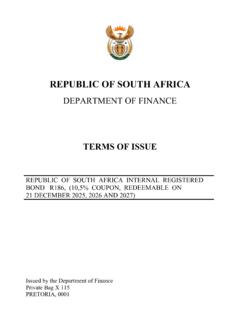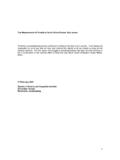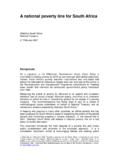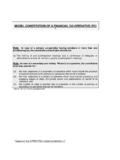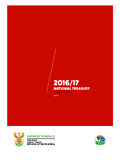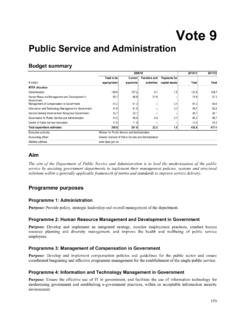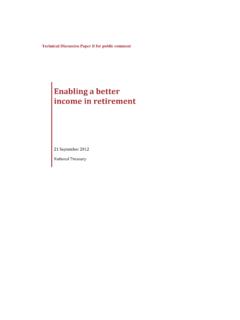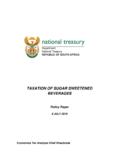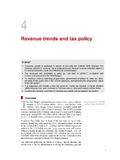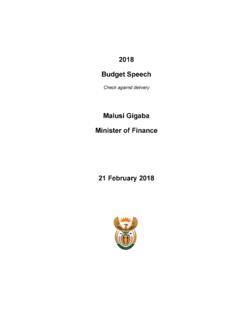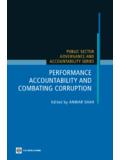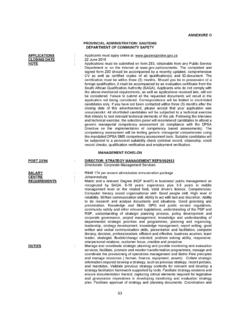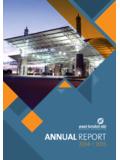Transcription of Financial sector regulation and reform - National …
1 169 D Financial sector regulation and reform Introduction The National Development Plan and the 2016 State of the Nation Address call for a Financial centre for Africa1 to develop regional links for the Financial services sector and support economic growth on the continent. There is substantial potential estimates suggest that south Africa has a 2 per cent market share of rest-of-Africa services By comparison, Brazil has 26 per cent of the market share in south America. A series of reforms has positioned south Africa as a regional Financial hub, with a substantial expansion in Africa-related Financial services business.
2 Revenue from the rest of Africa made up 17 per cent of total revenues for south Africa s four largest banks in 2014, bringing benefits in the form of foreign exchange, domestic jobs and tax revenue. The Financial and related business services sector contributes per cent of GDP and per cent of corporate tax revenue. Financial services reforms Financial inclusion About 84 per cent of south African adults used some form of Financial service in 2015, and 80 per cent of south Africans have a bank account. However, the inappropriate and unproductive use of credit has led to high levels of over-indebtedness.
3 Although the use of Financial services is increasing, there remains a need to focus on the small business sector . Only 30 per cent of registered small businesses have access to finance. To improve this situation, government plans to introduce a shared business credit infrastructure for small businesses. 1 National Development Plan 2030, page 149. 2 McKinsey Global Institute (Sept 2015) south Africa s Big Five: Priorities for Inclusive Growth. 2016 BUDGET REVIEW 170 The National Treasury will also publish a Financial inclusion policy document for public comment. The document assesses the state of Financial inclusion in south Africa, and puts forward general principles to guide more comprehensive improvements.
4 Foreign exchange market conduct modernisation Remittances south Africa is home to four of the five most expensive remittance corridors in the world, with an average cost of just above 20 per cent of the value of the remittance, compared to the worldwide average of just below 9 per cent. The National Treasury will expand market conduct reforms to apply to the retail foreign exchange market, which, together with more competition and exemptions in the Financial Intelligence Centre Act (2001), should reduce the compliance burden for low-risk remittances and lower charges. Financial surveillance manual The Reserve Bank will publish a simplified Financial surveillance manual on its website in July 2016.
5 Authorised dealers will also be encouraged to digitise and modernise the functioning of the foreign exchange market system. Foreign investment limits For a period of 12 months, institutions affected by the depreciation of the rand will not be required to rebalance their portfolios, but no further offshore investments will be allowed until the institution is within the prescribed offshore investment limit. Enhancing Financial integrity The integrity and stability of the international Financial system rests on its ability to effectively combat Financial crime. Parliament is considering amendments to the Financial Intelligence Centre Act to align it with international standards, which will include a risk-rated approach.
6 The National Treasury, the Financial Intelligence Centre, the Reserve Bank and the south African Revenue Service are working with relevant stakeholders to combat Financial crime and minimise illicit Financial flows. Twin peaks update A strong regulatory system is key to the success of any Financial hub. Parliament is considering legislation to implement a twin peaks framework for Financial regulation . In line with global trends, the framework will establish two complementary regulators. The Prudential Authority, situated in the Reserve Bank, will be responsible for the safety and soundness of Financial institutions, and the Financial sector Conduct Authority, which will replace the Financial Services Board, will be responsible for market conduct and securities regulation .
7 Improving Financial stability With the twin peaks model at an advanced stage in the legislative process, the National Treasury has begun developing additional reforms to improve Financial stability. These reforms aim to reduce the probability of a systemic event occurring, and contain the effects if it does. Resolution policy framework An effective framework to deal with the resolution of banks, major insurers and other systemically important Financial institutions ensures that the costs of private firms are borne by private creditors with no recourse to taxpayer funds. In 2015, the National Treasury, together with the Reserve Bank and the Financial Services Board, published a discussion document with proposals for an effective resolution regime and aims to present a draft bill by the end of 2016.
8 ANNEXURE D: Financial sector regulation AND reform 171 Prudential reforms south Africa s strength as a Financial hub for Africa relies on the safety and soundness of its banks and insurance companies. From 1 April 2016, new banking regulations will align the current framework with the Basel Committee s latest guidance. Basel III calibration The Registrar of Banks has proposed a recalibration of the net stable funding ratio, which forms part of the Basel III framework. This recalibration will reflect the volatility of wholesale funding. A run-off rate of 35 per cent is proposed for wholesale deposits of less than six months.
9 This will ensure compliance with international standards without causing undue harm to the economy. The ratio will become a minimum standard on 1 January 2018. Insurance Bill Parliament is considering an Insurance Bill to implement international standards for insurers. The bill provides a consolidated legal framework for the prudential supervision of the insurance sector that is consistent with international standards. It seeks to consolidate existing insurance legislation and facilitate Financial inclusion through a micro-insurance framework. Improving market conduct A market conduct policy framework and a draft Conduct of Financial Institutions Bill will be released in 2016.
10 The bill is intended to simplify and modernise market conduct regulation . If these proposals are adopted, all participants in the Financial sector will be affected, from traditional providers like banks and insurers, to relatively new entrants to the industry like mobile network providers. This will ensure a level regulatory playing field that facilitates market innovation, strengthens competition and ultimately serves the customer better. The ombud system south Africa has a fragmented statutory and non-statutory ombud system, with different approaches for different industries. Government proposes to merge various ombuds into a single system.
